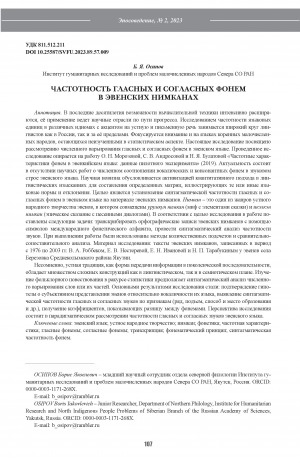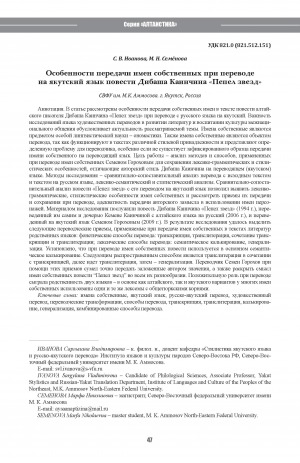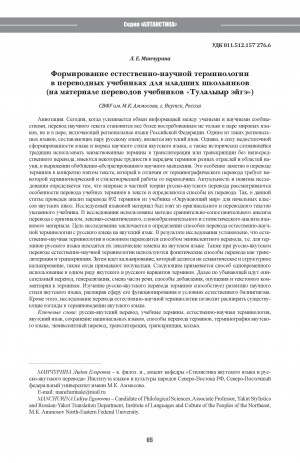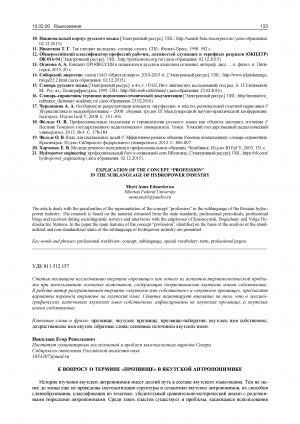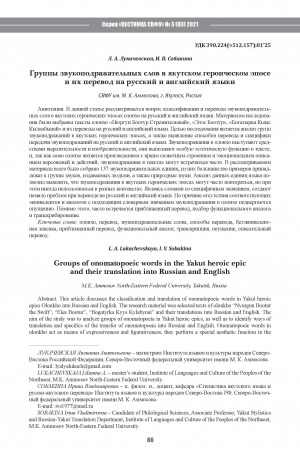
Перевод имен собственных якутского эпоса олонхо на русский язык (фонетический уровень) = Translation of proper names of the Yakut epic olonkho into Russian (phonetics)
Статья в журнале
Русский
398.22(=512.157).03=161.1
10.25587/2782-4861-2025-1-106-121
имя собственное; олонхо; способы передачи; специфичные звуки; дифтонг; гласные звуки; долгие звуки; согласные звуки; транскрипция; транслитерация; фонетический принцип; proper name; Olonkho; methods of transmission; specific sounds; diphthong; vowel sounds; long sounds; consonant sounds; transcription; transliteration; phonetic principle
Вестник Северо-Восточного федерального университета им. М. К. Аммосова. Серия "Эпосоведение". - 2025. - N 1 (37)
The article examines the methods of conveying the specific sounds of proper names from the Yakut heroic epic Olonkho into Russian. Based on the analysis of 1,131 proper names from 18 translated Olonkho texts, various approaches to representing sounds such as diphthongs (ie, uo, ya, üö), vowels (ü, ö), long vowels (аа, yy, оо, ii, uu, ee, üü, and öö), and consonants (dj, ŋ, һ, ğ, nj) were identified. The aim of the research is to analyze the ways of transmitting proper names in Olonkho during the translation from Yakut to Russian at the phonetic level. In contemporary translation studies, proper names are classified as a group of non-equivalent vocabulary, which is conveyed into other languages through transcription and transliteration methods. Transcription involves representing the phonetic form of a unit from one language using the phonetic system of another language, while transliteration entails replacing each letter or combination of letters from the source language with corresponding elements from the target language. Both methods play a crucial role in interlingual communication, allowing for the preservation of the original form and sound of proper names, which is particularly significant for maintaining cultural associations related to them. However, despite the desire to retain cultural connotations, traditional methods of transcription and transliteration often lead to distortions of the phonetic structure and difficulties in perceiving the text in Russian. Thus, translating proper names from Yakut requires a detailed analysis of the combinatorics of sound elements, as this factor determines the accuracy of reproducing the original phonetic image. The conducted analysis demonstrates that in the practice of translating proper names of Olonkho characters, a certain tradition has gradually developed, indicating a striving for a more consistent and accurate transmission of the original. Nevertheless, the proposed solutions are not always justified, highlighting the need for developing and standardizing methodologies that preserve the unique phonetics of the Yakut language when translating it into Russian.
Собакина, И. В. Перевод имен собственных якутского эпоса олонхо на русский язык (фонетический уровень) / И. В. Собакина, С. В. Семенова ; Северо-Восточный федеральный университет им. М. К. Аммосова // Вестник Северо-Восточного федерального университета им. М. К. Аммосова. Серия "Эпосоведение". - 2025. - N 1 (37). - С. 106-121. - DOI: 10.25587/2782-4861-2025-1-106-121
DOI: 10.25587/2782-4861-2025-1-106-121
- Языки народов Якутии > Якутский язык > Научные труды по якутскому языку > Фонетика,
- Общественные науки. Образование > Этнография. Обычаи. Жизнь народа. Нравы,
- Языкознание. Филология. Художественная литература > Языкознание и языки. Лингвистика > Якутский (саха),
- НАУКА ЯКУТИИ > ЯЗЫКОЗНАНИЕ. ФИЛОЛОГИЯ. ЛИТЕРАТУРОВЕДЕНИЕ. ХУДОЖЕСТВЕННАЯ ЛИТЕРАТУРА > Языкознание и языки. Лингвистика,
- НАУКА ЯКУТИИ > ОБЩЕСТВЕННЫЕ НАУКИ > Этнография. Обычаи. Жизнь народа. Нравы,
- НАУКА ЯКУТИИ > ЯЗЫКОЗНАНИЕ. ФИЛОЛОГИЯ. ЛИТЕРАТУРОВЕДЕНИЕ. ХУДОЖЕСТВЕННАЯ ЛИТЕРАТУРА > Литература. Литературоведение.
Войдите в систему, чтобы открыть документ

